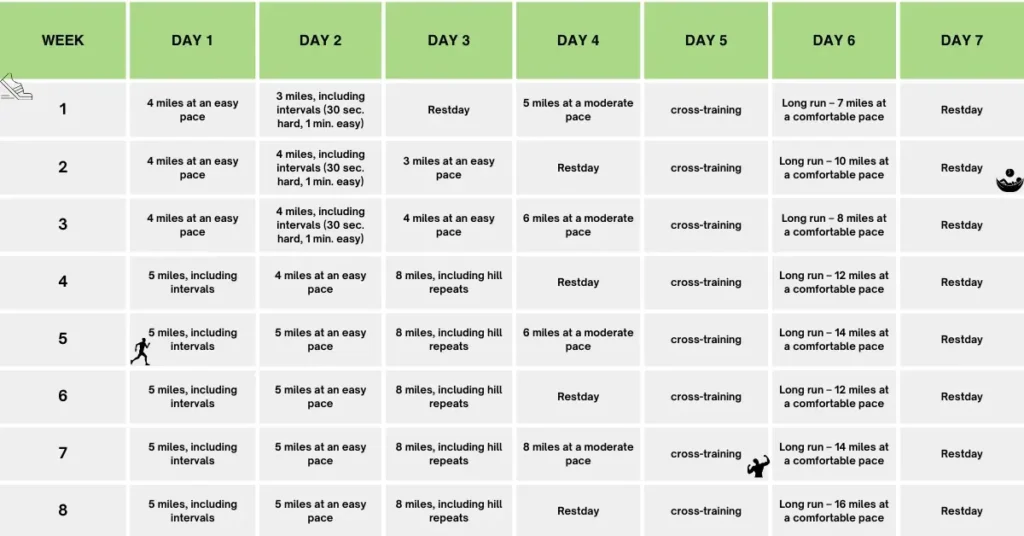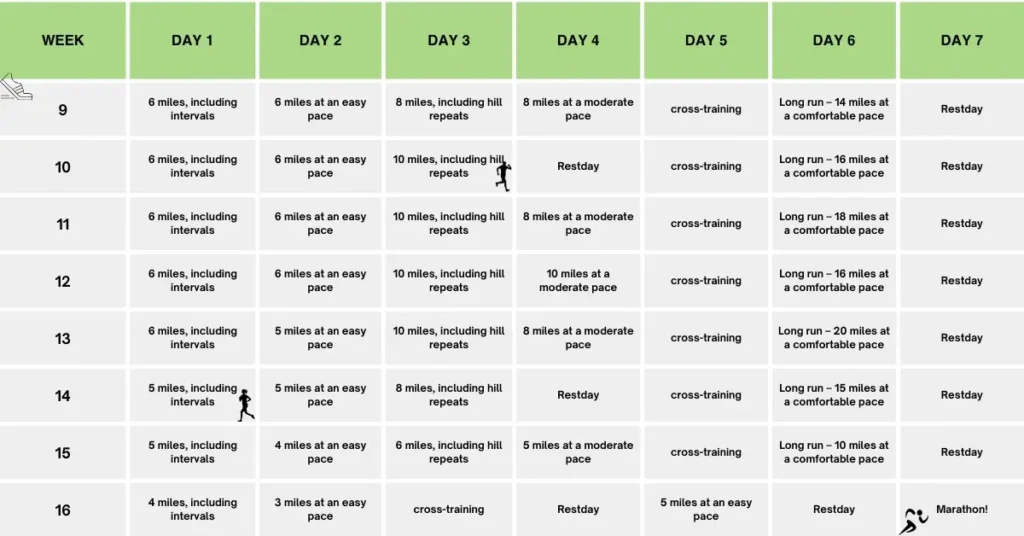Are you ready to take on the challenge of running a full marathon? If so, you’ll need a solid training plan to help you reach your goal. One popular option is a 16 week marathon training plan, which can help prepare runners of all experience levels for the 26.2 mile race.
During the 16 week marathon training plan period, you will gradually increase your mileage and incorporate different types of runs, to build endurance and speed.
Pros:
- ✅ Ultra-light, new-generation GPS multi sports smart watch
- ✅ Powerful training tools for 150+ sports
- ✅ Accurate GPS and long-life battery
- ✅ Bright display
Con:
- ❌ You often look at the watch while running
Your 16 Week Marathon Training Plan
Are you looking for a 16 week marathon training plan? Then you are exactly right with us! Our plan is suitable for both beginners and advanced runners. We bring you closer to your goals. Check it out!
Here is the first part of our 16 week marathon training plan

And here is the second part of our 16 week marathon training plan

Weeks 1-4: Base Building
The first four weeks of our plan focus on building a strong foundation. During this time, we’ll be running at a comfortable pace, gradually increasing our mileage, and incorporating strength training exercises to help prevent injury.
Weeks 5-8: Increasing Mileage
During weeks 5-8, we’ll be increasing our mileage to build endurance and prepare for longer runs. We’ll also start incorporating interval training to improve our speed.
Weeks 9-12: Speed and Endurance
Weeks 9-12 are all about building speed and endurance. We’ll be incorporating longer runs and hill repeats to improve our overall fitness.
Weeks 13-16: Tapering and Final Preparations
During the final four weeks of our plan, we’ll be tapering our mileage and focusing on final preparations for race day. We’ll also be incorporating more rest days to allow our bodies to recover.
That’s it! Follow this plan, stay consistent, and you’ll be ready to crush your marathon in just 16 weeks.
What do the different runs on the training plan mean?

As we embark on our 16 week marathon training plan, it’s important to understand the different types of runs that will be included in our training. Each run has a specific purpose and will help us achieve our goal of completing a marathon. Let’s take a closer look at each type of run.
Easy Pace
The easy pace run is a relaxed run that should be done at a comfortable pace. This type of run is important for building endurance and improving our aerobic fitness. During an easy pace run, we should be able to have a conversation without feeling out of breath. This run is typically done at the beginning of the week to help us recover from the previous week’s training.
Comfortable Pace
The comfortable pace run is slightly faster than the easy pace run but still should be done at a comfortable pace. This type of run helps us improve our aerobic threshold and running economy. During a comfortable pace run, we should be able to speak in short sentences without feeling out of breath.
Moderate Pace
The moderate pace run is faster than the comfortable pace run and should be done at a pace that feels challenging but sustainable. This type of run helps us improve our lactate threshold and running economy. During a moderate pace run, we should be able to speak in short phrases without feeling out of breath.
Long Run
The long run is the cornerstone of marathon training and is typically done on the weekends. This type of run is done at a comfortable pace and gradually increases in distance each week. The long run helps us build endurance and mental toughness.
Interval Run
The interval run is a high-intensity workout that involves short bursts of speed followed by periods of rest or recovery. This type of run helps us improve our speed, power, and running economy. During an interval run, we should be running at a pace that is faster than our race pace.
Hills

The hill run is a type of interval run that involves running up and down hills. This type of run helps us improve our leg strength, power, and running economy. During a hill run, we should be running at a pace that is faster than our race pace.
Crosstraining
Crosstraining is any type of exercise that is not running. This can include swimming, cycling, yoga, or weightlifting. Crosstraining helps us improve our overall fitness and prevent injury.
Rest Day
The rest day is just as important as any other type of run. Rest days allow our bodies to recover and adapt to the stress of training. During a rest day, we should avoid any type of strenuous exercise and focus on recovery.
By understanding the different types of runs in our 16 week marathon training plan, we can maximize our training and achieve our goal of completing a marathon.
Nutrition During Training
As we train for our 16 week marathon, it’s essential to focus not only on running but also on our nutrition. Proper nutrition can help us perform better, recover faster, and avoid injuries. In this section, we’ll discuss two critical aspects of nutrition during training: a balanced diet and hydration.
Balanced Diet
Eating a balanced diet is crucial for providing our bodies with the nutrients needed to fuel our runs and recover properly. A balanced diet should include a variety of foods from all food groups, such as:
- Carbohydrates: Carbs are our main source of energy, so we need to consume enough of them to fuel our runs. Good sources of carbs include whole grains, fruits, vegetables, and legumes.
- Protein: Protein is essential for building and repairing muscles. Good sources of protein include lean meats, poultry, fish, eggs, dairy, and plant-based sources such as beans, nuts, and seeds.
- Fats: Fats provide us with energy and help us absorb certain vitamins. Good sources of healthy fats include avocados, nuts, seeds, olive oil, and fatty fish.
- Vitamins and minerals: We need a variety of vitamins and minerals to support our overall health and performance. Good sources of vitamins and minerals include fruits, vegetables, whole grains, and dairy products.
Eating a balanced diet doesn’t mean we have to be perfect all the time. It’s okay to indulge in treats occasionally, but we should aim to make healthy choices most of the time.
Hydration
Staying hydrated is crucial for maintaining our performance and preventing injuries. We lose fluids through sweat, so it’s essential to drink enough water and electrolytes to replace what we’ve lost. A good rule of thumb is to drink at least half of our body weight in ounces of water each day.
During our runs, we should aim to drink water or sports drinks every 15-20 minutes to stay hydrated. We can also monitor our urine color to ensure we’re drinking enough. Clear or light-colored urine is a good sign that we’re hydrated, while dark yellow urine means we need to drink more fluids.
Injury Prevention and Recovery

As we prepare for a 16 week marathon training plan, it’s important to keep in mind that injury prevention and recovery are just as important as the training itself. In this section, we’ll cover some tips on how to prevent injuries and how to recover properly if you do get injured.
Rest and Recovery
Rest and recovery are crucial components of any training plan, especially a marathon training plan. It’s important to give your body time to recover between workouts and long runs. Here are some tips on how to incorporate rest and recovery into your training plan:
- Schedule rest days: Make sure to schedule at least one rest day per week. This will give your body time to recover and prevent burnout.
- Listen to your body: If you feel tired or sore, take an extra rest day or cut back on your mileage for the week.
- Get enough sleep: Aim for 7-9 hours of sleep per night. This will help your body recover and prepare for the next workout.
Injury Prevention Tips
Preventing injuries is key to a successful marathon training plan. Here are some tips on how to prevent injuries:
- What to wear for a marathon: Make sure you have the right shoes for your foot type and gait. Replace your shoes every 300-500 miles.
- Warm up and cool down: Always warm up before a workout and cool down afterwards.
- Cross-training: Mix up your workouts with cross-training activities like swimming, cycling, or yoga.
By incorporating these injury prevention and recovery tips into your 16 week marathon training plan, you’ll be able to stay healthy and injury-free throughout your training journey.
Mental Preparation
Preparing for a marathon involves more than just physical training. Mental preparation is equally important to help you stay focused, motivated, and confident throughout the 16 week marathon training plan.
Goal Setting
Setting realistic goals is an important part of mental preparation. It helps you stay motivated and focused on what you want to achieve. Start by setting a specific goal for your marathon, such as finishing within a certain time frame or completing the race without stopping.
Break down your goal into smaller, achievable milestones that you can work towards throughout your training plan. This can include increasing your mileage each week, improving your pace, or incorporating strength training into your routine.
Staying Motivated

Staying motivated throughout your 16 week marathon training plan can be challenging, but there are several strategies you can use to help you stay on track. One of the most effective ways to stay motivated is to find a training partner or join a running group. Running with others can help keep you accountable and provide support and encouragement when you need it.
Another way to stay motivated is to mix up your training routine. Incorporate different types of workouts, such as interval training, hill repeats, or cross-training, to keep your workouts interesting and challenging.
You can also set up a reward system for yourself, such as treating yourself to a massage or a new piece of running gear after reaching a milestone in your training.
Our Option on the 16 Week Marathon Training Plan
Hello guys, we think that with the 16 week marathon training plan we have once again given you a great option for both beginners and experienced runners.
In the 16 week marathon training plan we build up the distance and difficulty of our runs.
This means your body can adapt optimally to the new challenge.
I recommend the plan if you can already run between 5-10 miles. The pace doesn’t matter. It’s just about perseverance.
If this is too slow for you or you are already at a higher fitness level, then I recommend our 12 week marathon training plan.
If you are at the very beginning of your running career then I recommend our 52 week marathon training schedule.
FAQ
How many days per week should I run during a 16 week marathon training plan?
We recommend running at least 4 days per week during a 16 week marathon training plan. However, some plans may have up to 6 days of running per week. It is important to find a plan that works best for your schedule and fitness level. Make sure to include rest days and cross-training days in your plan to prevent injury and allow for recovery.
How long should my longest run be during a 16 week marathon training plan?
Your longest run during a 16 week marathon training plan should be around 20-22 miles. This will help prepare your body for the full 26.2 miles on race day. If you feel overly fatigued or experience pain during your long runs, it may be necessary to decrease the mileage or take an extra rest day.
How do I taper for a marathon during a 16 week marathon training plan?
Tapering is an important part of any marathon training plan. During the last 2-3 weeks before your race, gradually decrease your mileage to allow your body to rest and recover. This will help you feel fresh and energized on race day. It is also important to continue to eat a healthy diet, stay hydrated, and get enough sleep during your taper.
What’s your option on the 16 week marathon training plan? Let us know in the comments!



